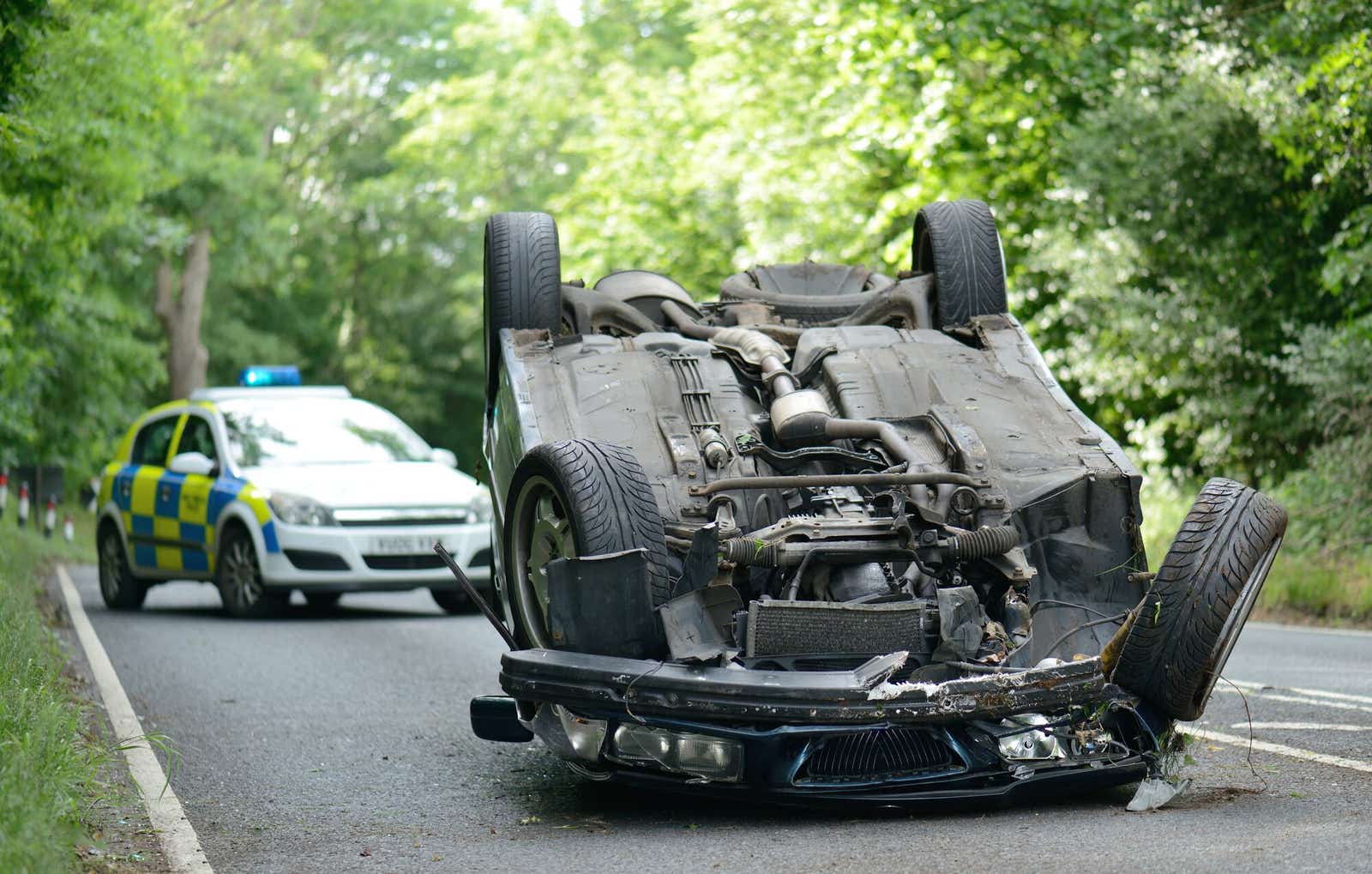When your car is declared a write off

 Car insurance write-off categories
Car insurance write-off categoriesGet a car insurance quote
See a range of car insurance quotes in just a few minutes when you compare with Uswitch
What happens if a car is written off?
If your car has been in an accident or damaged, for example in a storm or a flood, you will need to inform your insurer. Your insurance provider will then inspect the vehicle to determine if it is safe to drive again.
If your insurer decides the car is not salvageable or it would cost more than its value to be made roadworthy again, your car will be deemed a write off or ‘total loss’.
How does the insurer decide whether my car is a write off?
What is considered uneconomical depends on the insurance company and how it assesses the value of the damaged car.
Insurers will have a repair-to-value ratio
If a car was worth £10,000 and a repair-to-value ratio of 60% was applied then uneconomical repair would be repair costs exceeding £6,000
Car insurance companies employ vehicle assessors to calculate this
They will inspect condition of your vehicle and work out the cost of repair
Why some car write-offs don’t seem like ‘write offs’
When it comes to repairing a damaged car, insurers need to make sure the car can be returned to a similar condition before it was damaged. Repairs can work out to be very expensive and assessors will factor in specialist garages and materials. As a result, in some cases, minor damage such as a scrape could still be classed as a 'write off'.
An insurance write off does not always mean a vehicle is not roadworthy.
The Association of British Insurers has worked with the Driver and Vehicle Licensing Agency (DVLA) and insurance companies to grade different categories of write offs so people know whether they can still buy and sell a type of written off car.
My car is a write off – what do I do?
If your insurer informs you that your car is a write off, it will be retained by your insurance provider and you will get a cash settlement.
If you disagree that your car is a write off or have personal reasons for wanting to keep your car on the road, you may be able to dispute the decision (more on this later).
What are the different write off categories?
The Association of British Insurers (ABI) and the Lloyd’s Market Association (LMA) have produced a Salvage Code that was updated in 2017.
This was to reflect the complexity involved in repairing modern cars that may involve composite materials and complex designs.
The revised code scrapped the A, B, C, D categories and made them clearer:
A: Scrap
B: Break
S: Structurally damaged repairable
N: Non-structurally damaged repairable
The new categories make clear that certain vehicles cannot be repaired at all. This was to stop dodgy dealers putting unsafe vehicles back on the road.
Category A (unchanged): scrap
Category A applies to cars so badly damaged they should be crushed and never re-appear on the road. In other words, they are only suitable for scrap. Even salvageable parts must be destroyed. Vehicles in this category will be classed as waste.
Category B (unchanged): break
Cars in this category have extensive damage and are not roadworthy. The body shell of the car should be crushed. Some parts are salvageable, however, and reclaimed parts can be used in other roadworthy vehicles. This vehicle will be classed as waste.
Category S (formerly Category C): structurally damaged repairable
Category S means the vehicle has suffered structural damage, such as a bent or twisted chassis, or a crumple zone that has collapsed in a crash. The insurer has decided not to repair the vehicle. Your car will need to be professionally repaired to be roadworthy. It will also need to be re-registered with the DVLA.
Category N (formerly Category D): non-structurally damaged repairable
A vehicle in this category will not have sustained structural damage, so it may be a cosmetic issue. For it to have been a write off there have been a problem that wasn’t economical to repair.
Note that non-structural faults can include brakes, steering or other safety-related parts and these may need to be replaced.
Be warned: some category C and D cars written off before the changes were introduced may still be up for sale.
Can you insure a category N or D car?
If you can demonstrate you have fully repaired the car, it may be possible to insure the vehicle again. Not all insurers will offer cover, however, so you may end up paying more.
Can I insure a category S or C car?
Similar to the above, providing you can show you have professionally repaired the structural damage to the car and it has passed an MOT, some insurers may agree to offer cover for the vehicle.
What happens to my insurance when my car is written off?
Your insurance policy will end once the claim is settled and your insurer pays out. If your car is in category N or S, you can agree to keep your car and have it repaired. When you complete repairs you will then need to get a new insurance policy before driving on the road.
To keep a category S vehicle, you also need to:
Send the complete logbook to your insurance company
Apply for a free duplicate log book using form V62
DVLA will record the vehicle’s category in the logbook. You can keep the logbook if you want to keep a category N vehicle.
What happens after my car is written off?
Your insurance company will offer you a settlement figure. If you agree with it your insurance company will have the vehicle scrapped for you.
If your car is written off, you may also want to:
Apply to take the registration number off the vehicle if you want to keep it
Send the vehicle log book (V5C) to your insurance company,
Tell the DVLA your vehicle has been written off – you can be fined £1,000
If my car is written off how much will I get?
The settlement you’ll receive will depend on what the assessor agrees the car is worth before it was damaged. Your insurer’s pay out should be enough to replace your car with a similar vehicle in a similar condition in your area, normally with the excess deducted.
Be warned that it is unlikely you will get the same value as you paid for it.
What if I don’t agree with my car insurer’s write off value?
Every insurer will have room for a second, slightly higher offer, if you negotiate. To help you negotiate, consider the following:
Research the prices of vehicles of a similar age and mileage – online or in motor trade magazines
Make sure anything you have done which may have increased its value – such as new tyres or stereo - is taken into account.
You can also pay for an engineer’s report to independently value your car.
If you and your insurer cannot come to an agreement, you can complain and then take your case to the Financial Ombudsman Service. The value of write-offs is a major source of complaints and the ombudsman upholds about half of all complaints.
The ABI/Lloyd’s Salvage Code says: “In the event of a dispute between the insurer and other interested parties regarding categorisation, the matter should be escalated to an appropriately qualified person who assumes responsibility for the final decision.”
What happens if my car is written off and it's not my fault?
Fully comprehensive insurance will cover you regardless of whether or not you’re at fault.
If the accident was the other driver’s fault, you would be claiming for damages under their third party insurance policy.
If the other driver isn’t insured, there’s still a way to make a claim through the Motor Insurers’ Bureau.
If my car is written off can I keep it?
While many insurance write offs are sent to the scrapyard, a write off doesn’t automatically mean the end.
A car can be assigned to a write off category depending on the severity of the damage, and many written off cars find their way back onto the road or the used car market.
If you want to keep your car, the insurance company will give you a payout and sell the vehicle back to you.
Driving a write off
Cut and shut motors are vehicles when two parts of a car are fused together. They may have been the rear end of a car involved in a frontal smash and the front of a car involved in rear-end smash.
These vehicles are not roadworthy, the DVLA estimates there were around 30,000 cut and shuts on UK roads in 2018.
The best way to ensure you don’t end up owning one is to have an independent vehicle check from the RAC or AA.
Should I buy a written off car?
You could find a bargain on the used car market if you're willing to buy a previously written off car, but it’s important to fully understand what each category means and how much damage the car has sustained.
Category A and B cars should be scrapped, so if you see one for sale it’s best avoided (unless you are buying a category B car to salvage parts only)
Category N and S cars should be safe to drive again once they have been professionally repaired
Once a car has been repaired it will need to be re-registered with the DVLA and pass an MOT to ensure it is safe to drive. You should check with the seller whether this has already been done or if they are selling it as a fixer-upper.
It’s also worth considering the resale value as previously written-off vehicles tend to be worth much less, even after they’ve been repaired.
Can I insure a previously written off car?
If you’ve bought a previously written off car, it’s not impossible to find cover but you will need to shop around and compare quotes carefully. It’s crucial that you always declare the car’s status to your insurer to ensure you don’t invalidate your cover.
Compare car insurance quotes to find out how much it may cost
Insuring a write off
If you’re fully aware of all the drawbacks of a written off car, you may decide that the potential savings are worth it.
Reduce your insurance costs with a multi-car insurance policy.
For example:
If you own more than one car
If you’re a family with more than one driver
If you’re a couple with more than one vehicle
Get a car insurance quote
See a range of car insurance quotes in just a few minutes when you compare with Uswitch